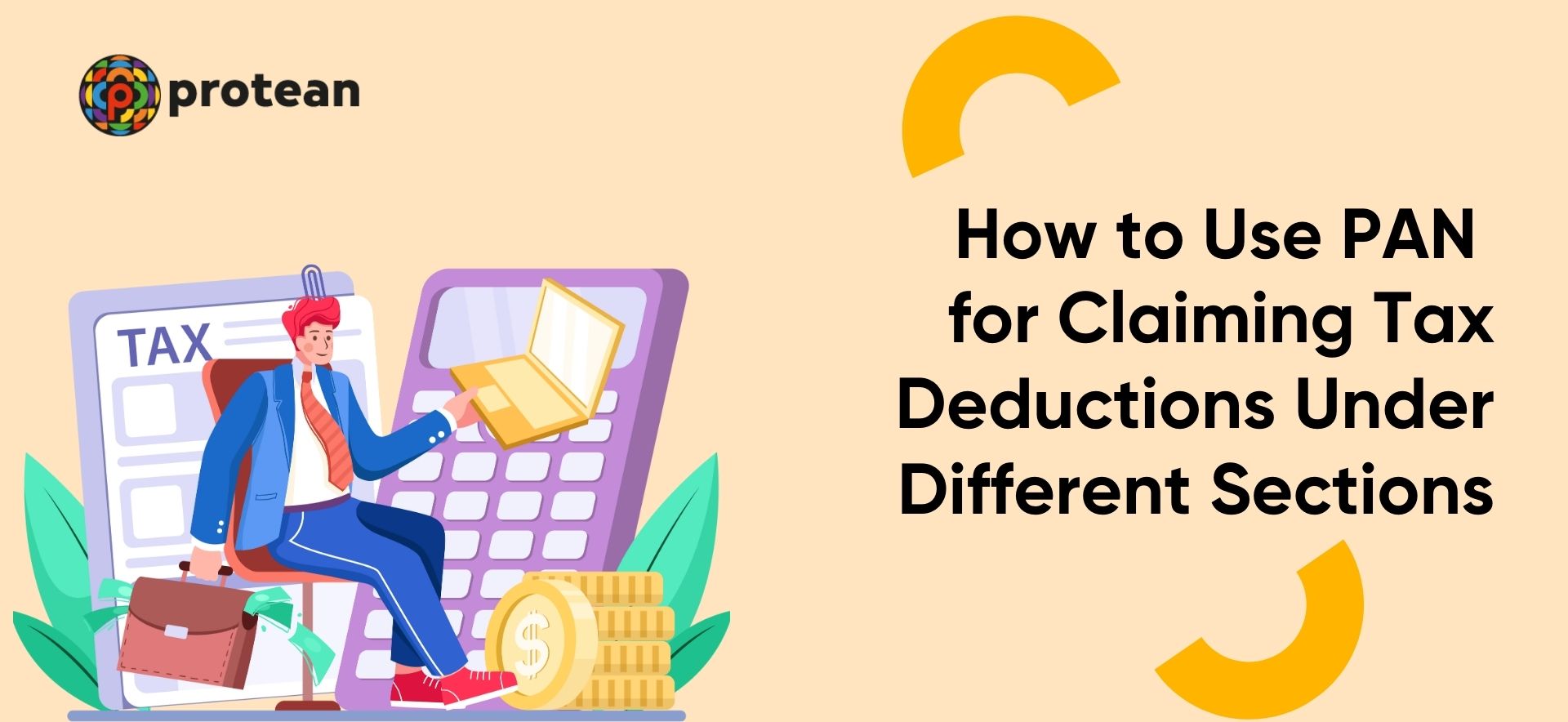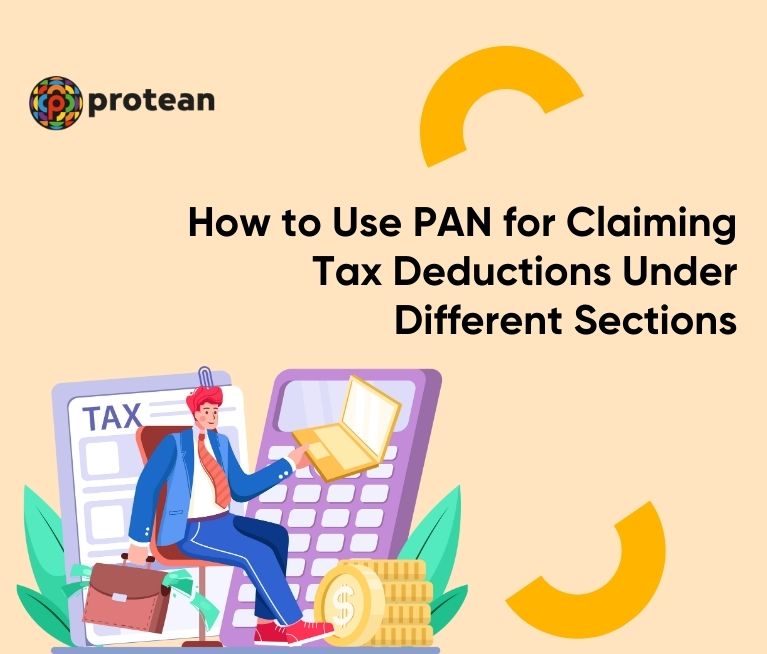PAN: Your Financial Identity Card Benefits of Having a PAN Card for Tax Savings Importance of PAN in Compiling Your Assets |
Managing taxes can often feel like navigating a complicated maze. However, with the right tools and knowledge, individuals can maximise their tax savings while ensuring compliance. One of the most essential tools in India’s tax system is the Permanent Account Number (PAN). Though it may seem like just another number on your documents, the PAN is more than just an identifier – it is a key to unlocking numerous tax-saving opportunities under various sections of the Income Tax Act.
In this blog, we will explore how the income tax PAN card is necessary for tracking financial activities and critical for maximising tax deductions.
PAN: Your Financial Identity Card
At its core, the PAN serves as your unique financial identity in the sights of the Income Tax Department. Issued by the Income Tax Department of India, this ten-digit alphanumeric number tracks all your financial transactions, from opening bank accounts to investing in mutual funds and even filing taxes. Essentially, your PAN connects all your financial activities, making it an indispensable tool for tax planning.
Many of these opportunities, particularly those related to income tax savings, become unavailable without a PAN.
Benefits of Having a PAN Card for Tax Savings
PAN enables individuals to take advantage of various tax-saving options available under Indian tax laws. These savings can be achieved through investments in specific schemes, deductions for certain expenses, and exemptions for specific types of income. Here are some popular sections under which you can claim deductions using your PAN:
1. Section 80C: Deductions on Investments
Section 80C is one of India's most widely known sections for tax-saving investments. It allows you to claim deductions on investments up to Rs.1.5 lakh. This includes contributions to the Public Provident Fund (PPF), Employee Provident Fund (EPF), National Savings Certificates (NSC), and premiums paid on life insurance policies. In addition, investments in the Equity Linked Savings Scheme (ELSS) also qualify for deductions under this section.
Your PAN is mandatory for investments in these schemes. When you make these investments, your PAN is linked to the transaction, ensuring that you can claim the corresponding tax deductions when filing your Income Tax Returns (ITR).
2. Section 80D: Deductions on Health Insurance
Under Section 80D, you can claim tax deductions on premiums paid for health insurance policies. This applies not only to the policy for yourself but also for your family members. If you pay premiums for your parents' policy, you can also claim deductions. The amount of deduction depends on the age of the insured and the type of policy.
When you make health insurance payments, your PAN must be linked to the transaction for the deductions to be valid. Without a PAN, the tax-saving benefit may not be applicable.
3. Section 80CCD: National Pension Scheme (NPS)
Another significant tax-saving avenue is the National Pension Scheme (NPS), which allows you to save for retirement while benefiting from tax deductions. Contributions made to the NPS are eligible for deductions under Section 80CCD, over and above the Rs.1.5 lakh limit of Section 80C.
Under this section, you can avail of an additional Rs.50,000 deduction for NPS contributions. This makes the NPS an attractive option for long-term retirement savings, as it helps secure your financial future and provides significant tax relief.
Your PAN is essential when contributing to the NPS. It is used to track your contributions and facilitate tax benefit claims.
4. Home Loan Interest Deductions
Section 24(b) provides a deduction for the interest paid on home loans. If you have a home loan, the interest component paid during the financial year can be claimed as a deduction under this section, up to Rs.2 lakh. Your PAN is linked to the home loan account, making it essential to
claim the deduction while filing your tax returns.
5. Education Loan Interest Deductions
Under Section 80E, taxpayers can claim deductions for interest paid on loans taken for higher education. This deduction is available for loans taken for yourself, your spouse, or your children. Since the loan is typically repaid over several years, the interest paid in each year can be claimed as a deduction.
Again, your PAN is required for the loan account and for claiming these deductions when filing your ITR.
| Also Read: PAN Card Tax Savings |
Importance of PAN in Compiling Your Assets
The PAN is not just a tool for claiming tax deductions; it also helps track your assets and financial transactions. As per Rule 114B of the Income Tax Rules, 1962, PAN is mandatory for certain transactions like purchasing property worth over Rs.10 lakh. Your PAN ensures that these transactions are recorded in the Income Tax Department’s system, making it easier to track your financial activities and comply with tax regulations.
When you make significant financial investments, such as purchasing property or buying high-value goods, your PAN is used to document these purchases. This helps establish a clear and transparent record of your assets, which, in turn, supports accurate and honest income tax declarations.
Simplifying Tax Filing with PAN
Filing your Income Tax Returns (ITR) becomes significantly easier with a PAN card. With your PAN linked to all your financial transactions, filing taxes becomes streamlined and efficient. Here’s how PAN simplifies the tax filing process:
1. Pre-filled ITR Forms
When you file your taxes online, most of the information, such as your TDS (Tax Deducted at Source) details, salary earnings, and other income sources, will be automatically filled in your ITR form. This is possible because your PAN is linked to your financial records. It saves you
time and reduces the chances of errors in manual entries.
2. Faster Processing of Returns
The Indian Income Tax Department processes returns linked to PAN more quickly, which leads to faster tax refunds. If you expect an income tax refund status, you can track it using your PAN. The link between your PAN and your bank account facilitates the direct transfer of the refund amount, ensuring quicker disbursal.
3. Avoiding Penalties
Your PAN is required for all major financial transactions, and using it ensures you remain compliant with tax laws. Non-compliance or failure to use PAN in transactions could lead to penalties. By maintaining a proper PAN record, you avoid the risks of such penalties and stay on track with your tax obligations.
| Also Read: PAN Card Benefits |
Conclusion
Your PAN card is more than just an identification number; it’s your gateway to effective tax planning and maximising income tax savings. By leveraging the PAN system, you can claim tax deductions under various sections like 80C, 80D, and 80CCD while keeping track of your financial activities. It simplifies the tax filing process and ensures you don’t miss opportunities to reduce your tax liabilities.
Your PAN card plays a critical role in all of these activities, whether you are investing in ELSS, contributing to NPS, paying health insurance premiums, or claiming home loan deductions. Make sure to keep it safe and readily accessible, as it’s an essential tool for maximising your income tax savings and ensuring a hassle-free financial life.
FAQs
1. How does my PAN card help in claiming tax deductions?
Your PAN card links all your financial transactions, making it easy to claim tax deductions under different sections of the Income Tax Act. Without PAN, you may not be able to avail benefits like deductions on investments, health insurance, home loans, and education loans when filing your tax returns.
2. What tax deductions can I claim under Section 80C?
Under Section 80C, you can claim tax deductions up to ₹1.5 lakh for investments in PPF, EPF, NSC, life insurance, and ELSS funds. Your PAN must track these investments and ensure you receive the deductions when filing your income tax return.
3. Can I claim tax deductions on health insurance premiums?
Yes, under Section 80D, you can claim tax deductions on health insurance premiums paid for yourself, your family, and even your parents. Your PAN must be linked to the insurance policy for the deduction to be valid while filing your taxes.
4. How can I use my PAN to claim deductions on a home loan?
If you have a home loan, you can claim tax deductions under Section 24(b) on the interest paid, up to ₹2 lakh per year. Your PAN must be linked to your home loan account for the deduction to be processed smoothly when filing your income tax return.
5. Is PAN necessary for claiming education loan tax deductions?
Yes, under Section 80E, you can claim tax deductions on the interest paid for an education loan. Whether the loan is for you, your spouse, or your children, your PAN must be registered with the loan account to ensure the deduction is applied when filing taxes.
| Also Read: PAN Card Guide |
Written by Bruhadeeswaran R.
Bruhadeeswaran R. is a B2B content expert with 14+ years of experience, specializing in National Pension System (NPS), PAN, DPI, eSignPro, and Central KYC. As Editor and Lead Content Writer at Protean eGov Technologies, he simplifies complex e-governance topics through engaging blogs, reports, and digital content.

